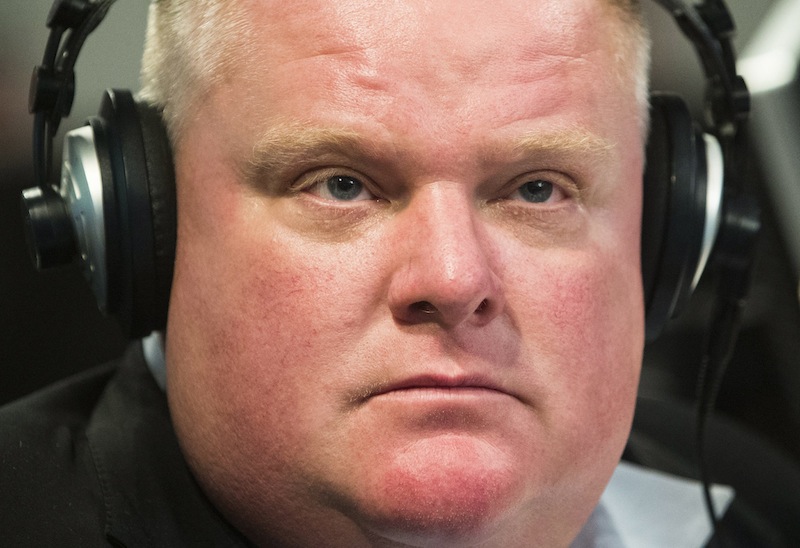TORONTO (AP) — Cries of “shame” rose up as Toronto Mayor Rob Ford walked up to the podium to honor war veterans. One World War II veteran refused to shake his hand, calling him a “druggie.” Unfazed, Ford declared to a supporter moments later, “I’m not going anywhere.” The next day, he was signing bobblehead dolls of himself at City Hall to raise money for charity.
Ford’s refusal to resign over his admitted drug use has confounded Toronto’s City Council. Allies and opponents alike agree that a stream of revelations of the mayor’s erratic behavior — from smoking crack cocaine in a “drunken stupor” to threatening to kill someone in a videotaped tirade — has consumed Toronto’s politics and has impacted the City Council’s ability to tackle other challenges.
But with no clear legal path to force him out, the 44-member City Council is grasping for ways to shunt the larger-than-life leader aside and govern without him until next year’s municipal elections.
It is an unprecedented effort but in some ways, it may not be a stretch. Toronto’s mayor already has limited powers compared to the mayors of many large cities in the United States. He is just one voting member in the council and his power stems mostly from his ability, as the only councilor elected by citywide vote, to build consensus and set the agenda. That authority, many council members say, has evaporated in the crack scandal.
“We really just have to build a box around the mayor so we can get work done,” said councilor John Filion, who has introduced one of two motions in the council designed to isolate Ford.
The first motion, which goes to a vote Wednesday, would call on Ford to take a leave of absence, apologize to Toronto residents for misleading them and cooperate with police. If he refuses, the council would ask the province of Ontario to pass legislation to remove the mayor from office.
The City Council has no authority itself to oust Ford because he has not been convicted of a crime. Toronto police said last month they had obtained a long-sought video of Ford apparently smoking from a crack pipe but that it does not constitute enough evidence to charge him.
The motion was introduced by City Councilor Denzil Minnan-Wong, who had long been a supporter of the conservative Ford’s policies.
In an opinion piece in the Globe and Mail, Minnan-Wong said he had been encouraged when Ford was elected three years ago, riding a backlash from suburbanites who felt alienated by what they deemed Toronto’s downtown-centric, liberal-dominated politics.
“We shared the same policy aims: frugal government, working to eliminate waste, contracting out work where it made sense, and respect for the tax dollars of Torontonians,” Minnan-Wong.
“No longer is there confidence in his judgment” wrote Minnan-Wong, who is on Ford’s executive committee. “Rightly or wrongly, Mr. Ford has lost the moral authority to lead.”
News reports of the crack video’s existence first surfaced in May, but it has not been released publicly.
After police announced they had the video, Ford confessed that he smoked crack last year while drunk and apologized. But he insisted he is not addicted to drugs and does not need rehab. He says he is ready to make his case before the increasingly hostile City Council.
“It’s going to be rumble in the jungle tomorrow,” Ford said Tuesday, as he autographed a “Robbie Bobbie” bobblehead doll at City Hall.
Despite the growing cries for Ford to go, the motion is unlikely to pass. Many councilors are loath to ask Ontario’s provincial government to intervene in Toronto’s municipal affairs, fearing it would set a dangerous precedent. Provincial government officials have publicly expressed reluctance to do so.
Another proposed motion would curtail Ford’s powers, suspending his authority to appoint and dismiss the deputy mayor and his executive committee, which runs the budget process. It likely won’t be debated until December because of the council’s procedural rules.
Filion, the councilor who introduced that motion, said the idea is to prevent Ford from firing executive committee members — such as Minnan-Wong — who speak out against him. Councilors are also considering stripping Ford’s authority to set the City Council’s agenda, said Councilor Adam Vaughan, who opposes getting the province involved.
“We will shun him, curtail his power as best we can,” Vaughan said. “He clearly has gone off the deep end, shot himself in outer space.”
Despite his eroding political leverage, Ford promises to see re-election. He maintains a hardcore of supporters he refers to as “Ford Nation,” who applaud him for abolishing an annual $60 vehicle registration tax, squeezing valuable concessions out of the labor unions and other cost-saving measures.
“It won’t be the end of Ford Nation,” said Nelson Wiseman, a political professor at the University of Toronto. “The movement and the anti-government sentiment it embodied that got him elected will stay alive.”
Among the hundreds of people lining up for bobbleheads, plenty defended the mayor, who despite coming from a wealthy family, has cultivated a brash, everyman appeal.
“I’m just going to put it on the shelf and enjoy it,” said John Rowland, of the “Robbie Bobbie” he waited to purchase.
“Everyone has their own personal problems. He’s finally admitted to it. I really don’t think that affects what he’s doing here at city hall.”
Copyright 2013 The Associated Press. All rights reserved. This material may not be published, broadcast, rewritten or redistributed.










